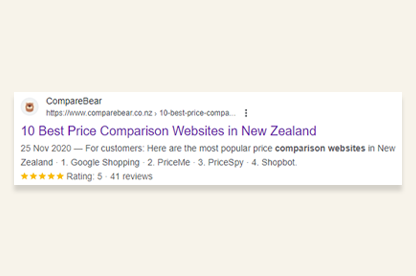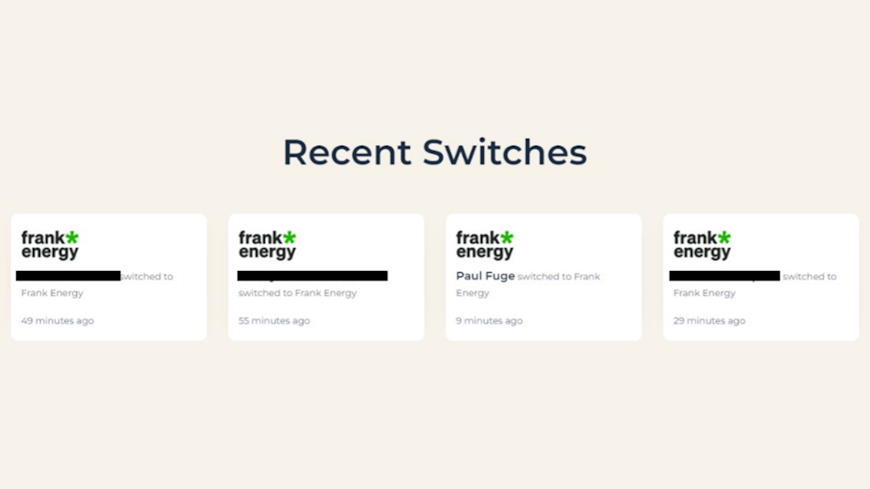
By Ruairi O'Shea
Former Investigative Writer | Kaituhi Mātoro
CompareBear came to our attention when a member of the public had a negative experience with the business. We spent months investigating CompareBear’s website and its online reviews, and we don’t like the dodgy practices we’ve seen.

We came across CompareBear by accident, when a member of the public called us about the way in which her energy supplier had been switched. In attempting to navigate to Powerswitch online, she ended up on CompareBear’s website, and was unhappy with her experience.
But as we spent time on CompareBear’s website, we spotted some red flags. There was a suspicious-looking customer counter, and while the website claimed to have 41 5-star reviews, we couldn’t find any evidence of them. So, we started digging.
Here, we detail our investigation of CompareBear’s online presence, its misrepresentation of customer interactions, and a series of its questionable reviewing practices, including its potential incentivisation of reviewing, reviews left by friends and family, and a number of reviews that CompareBear has been unable to substantiate. You might never look at online reviews the same way again.
What is CompareBear?
The New Zealand-based CompareBear website offers price comparisons for broadband, power, insurance, mobile plans, KiwiSaver and loans. Online reviews emphasise how easy the site is to use, and the money it saves.
CompareBear was set up somewhere between 2018 and 2020, and it is one of several businesses operating under the umbrella of a company called Acquisition Lab, alongside a more popular comparison website called glimp. These businesses were set up by their founders Denis Tyurkov and Michael Speight.
Tyurkov states that glimp is a seven-figure business. While it is based in New Zealand, most of its employees are located in the Philippines. A submission made by glimp to the Ministry for Business, Innovation and Employment refers to CompareBear and glimp as a single website and service, and reports that in 2018 glimp had 69,783 unique users, while CompareBear had 5,000.
The submission also emphasises the reviews the websites have gathered, stating “our service is rated 4.7 out of 5 from more than 220 reviews on Google”.
Investigating CompareBear
Website reviews in Google’s search listing

When we began investigating CompareBear last October, it typically appeared on the first page of search results for “comparison websites” on Google, with its 5-star rating from 41 reviews prominently displayed. Google pulls these ratings that appear in its search listing from the CompareBear website.
Generally, the higher up a company appears in a search engine’s search results, the more potential customers will visit its website. Positive reviews help bump a company up the search results, while also providing an opportunity to demonstrate competence to potential customers.
Creating the impression that your website has a high number of good reviews is easy, according to Chris Pointer, head of website performance and content at digital marketing agency Reason.
“To send a signal to the Google search engine that your website has a 5-star rating is very easy. All that is required is for a small piece of code to be added to the website – in this code you can specify the number of reviews and their average rating. This should reflect actual reviews that your business has received, however you can put whatever figures you like in this code. It is extremely easy to fake a large number of 5-star reviews in this way.”
We asked CompareBear to explain the origin of its website reviews, so we could ensure that they were legitimate.
CompareBear said, “We used to use Trustpilot to gather reviews however that relationship ended as it was too expensive to continue.”
We asked Trustpilot whether it had any record of CompareBear’s reviews.
Trustpilot said, “Our Fraud & Investigations team has taken a look into CompareBear on Trustpilot and could find no records of CompareBear.co.nz ever having existed on Trustpilot … For context, we very rarely delete company profile pages on Trustpilot … we let consumers decide which businesses are reviewed on Trustpilot – it's not up to us, we simply host the content.”
When we notified CompareBear of Trustpilot’s statement, a representative said that it was, “my mistake in assuming that we had dealt with Trustpilot regarding these reviews”.
CompareBear stated that its search listing reviews had been updated to reflect its verifiable reviews. At the time of writing, CompareBear’s website now claims that it has three 5-star reviews, and the previously claimed 41 5-star reviews remain unsubstantiated.
Manipulating Google and Facebook reviews
Early in our investigation, CompareBear had a handful of reviews on Google and Facebook.
However, all the positive reviews could be attributed to friends and family of the founders of the business, and at no point were the relationships between the individuals disclosed.
One review on Facebook from an immediate family member said, “I’m so glad I came across CompareBear. We were just about to move house and I was dreading about changing broadband and power, but a friend recommended them and it was super simple to use.”
When we highlighted this to CompareBear in a pre-publication copy of our article, it said, “We accept that relatives, and people known to us, have used the service. However, they are legitimate users of the service, like anyone else, and their reviews are legitimate reflections of their experience with CompareBear.”
But as we waited for this comment from CompareBear, something strange began to happen. Having received five Google reviews in the past 5 years (four 5-star reviews from friends and family of the business founders, and one negative review), CompareBear suddenly received 13 new reviews in a 48-hour period.
To get these reviews, CompareBear appears to have incentivised customers by offering them the chance to win a $200 Mitre 10 voucher in exchange for a review. One reviewer said, “Great service will be even greater service if I won the $200 Mitre 10 gift card”. Then, a few days after the surge of reviews, a CompareBear employee notified another reviewer that they had won the prize.
Ask yourself this: Would you be more likely to give a positive review if you’re being entered into a competition for a financial reward?
If the answer is ‘Yes’, you’re not alone. Academic literature shows that incentivisation drives a higher volume of reviews and a higher level of positivity in reviews than when there is no incentive. One study has shown that when consumers are entered into a draw for either USD$200, or a product worth the same value, reviews contain 40% more positive language than those from non-incentivised consumers.
We reported CompareBear’s actions to Google and asked whether it breached its policy on reviews. Google did not address our questions but indicated that it’s investigating the case. It appears, though, that these reviews did represent a breach of Google’s policies. Shortly after we brought CompareBear to Google’s attention, the two reviews which referred to incentives were removed. Two weeks later, a further eight reviews were removed. As of May 2024, CompareBear had eight Google reviews, with an average rating of 3.5 stars.
Misleading customer interactions
CompareBear also appears to be falsifying consumer interactions on its website – a potential breach of the Fair Trading Act.
Paul Fuge, manager of Powerswitch, entered his details in the power comparison page on CompareBear’s website to see what sort of quotes he’d receive. He did not change his energy provider.
But that’s not how CompareBear represented the interaction. On its homepage, it claimed Paul had switched to Frank Energy, alongside three other individuals who presumably also did not consent to their name being used in this way.

(Note: we have obscured the names of the other people to protect their privacy.)
When we put this claim to CompareBear, it said, “Regarding the ‘Recent Switches’ tool, we have now changed the language used to provide consumers with a clearer understanding of what our data represents. We have changed from ‘switched’ to ‘chose’. We believe this better represents the purpose of the tool, which is to represent website users’ preference for a particular service provider.”
CompareBear’s explanation appears to suggest that a potential customer will understand that if someone “chose” a new provider, it did not necessarily mean that they became a customer of that company, but rather, just looked at information about it. We believe CompareBear’s representation of users’ interactions was misleading before, and it’s still misleading now.
The CompareBear website also displays a customer counter.

When we checked on 16 October 2023, CompareBear claimed it had helped 8,135 users. One month later, it had dropped by over 2,200 users, but was still ticking up at around a user per second.
We raised this issue with CompareBear and it blamed the issue on a “website bug that was affecting this counter”. CompareBear states the counter was originally under-reporting and, at the time of writing, the counter reads 41,107. It no longer depicts a constant flow of customers.
Is this illegal?
The Fair Trading Act makes it illegal for anyone in trade to mislead customers, give false information, or make misrepresentations.
We are concerned that CompareBear’s website, and actions taken to manipulate reviews on Google and Facebook, appear to breach Commerce Commission guidance on online reviews. The guidance states reviews must be genuine and presented in a way that does not mislead readers about the overall message intended by the reviewer. The guidance also states businesses should not write, request or publish fake reviews, and that any relationship affecting the impartiality of a review should be disclosed.
Consumer NZ chief executive officer, Jon Duffy, said, "We are concerned CompareBear is not complying with its obligations under the Fair Trading Act. We'll be raising this with the Commerce Commission and encourage any consumers who consider they've been misled by CompareBear to do the same."
The importance of online reviews
Online reviews have become important influences for how consumers spend their money.
Consumer research undertaken in 2023 shows that 52% of New Zealanders often or always use product reviews before making purchasing decisions, while 50% consider it very or extremely important to use product reviews before buying something.
When we asked New Zealanders what specific information they look for when making a purchase, 62% named customer reviews and ratings, compared to 45% who look at reviews by experts.
Chris Pointer, head of website performance and content at digital marketing agency Reason, said the presence of positive reviews in search listings is very important. “Some studies put the increase in purchases for business pages which have reviews as high as 50%. We always recommend to our clients to generate both on-site reviews and Google reviews as we believe it is a very positive factor for driving more sales.”
The importance of positive reviews provides a significant incentive for businesses to generate them. For some businesses, this includes creating dubious positive reviews, which mislead customers as they make purchasing decisions. CompareBear is not alone in using this practice.
How widespread are fake reviews?
Fake reviews are so widespread the UK government commissioned a report into them. The report estimates between 11.1% and 12.9% of reviews on Amazon for home and kitchen, electronics, and sports and outdoors products are fake.
Yelp, another popular review site, flags around 25% of its reviews as being less reliable, while a study quoted by the US Federal Trade Commission reports that 10.7% of Google reviews are likely to be fraudulent.
Fake reviews also have a significant economic impact. In 2021, the World Economic Forum estimated that fake online reviews influence $791 billion worth of e-commerce spending annually in the US, $6.4 billion in Japan, $5 billion in the UK, $2.3 billion in Canada and $900 million in Australia (all amounts listed in US dollars).
Online reviews – can they be trusted?
Reviews are a popular way for shoppers to make an informed decision, whether that's eating at a local restaurant or buying a new set of headphones. This leads to the question – how can you know what to trust online?
Fake reviews are everywhere, but if you know they’re fake, you can avoid being influenced by them. When looking at reviews online, consider the following.
Look beyond the star ratings: It’s impossible to spot a fake from a
star rating alone, but the text of reviews will often show
irregularities. Do many of the reviewers have the same last name? Are
all the reviews vague? Do they repeatedly mention the name of one
member of staff? These are all reasons to be suspicious.The devil is in the detail: Fake reviewers don’t do a lot of research
before they write and often just repeat details from the business
name or homepage. If there’s nothing new in the review, ignore it.Look at a reviewer’s history: On some websites, you can look at a
reviewer’s history. Where they’ve made several reviews, check if
they’re all suspiciously vague or all mention the same staff member?
If so, this could be a sign of systematic review creation.Don't treat online reviews as the holy grail for information: Use
reviews as one form of intelligence gathering, but where possible
seek out recommendations from trusted sources like family, friends,
or independent experts like Consumer.

Scams and how to avoid them
Wondering if that email or phone call is a scam? Learn about the most common types of scams and how to protect yourself.



